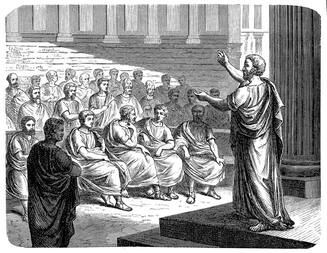RETHINKING EKKLESIA?

I'm seeing the word ecclesia popping up a lot lately and have used it widely myself as a metaphor or description for the church as ‘the called out ones’, but ‘called out’ to be what?
Clearly the mandate is salt and light in places that have become darkened and lost their flavor. But are we getting this lantern on a hill and saltshaker stuff right?
So many terms used in the bible have been borrowed from the popular culture of the time and made to mean something different than was intended in the proper context.
The term ecclesia (ekklesia) for example is used as a name for the church meeting as a congregation or a wider body regardless of denominations with the inference of being called out from the world and no longer to be part of it.
So how can you make a difference or be the difference if you aren’t engaging with those outside your Christian peer group?
Ecclesiology is the study of the Christian Church, the origins of Christianity, its relationship to Jesus, its role in salvation, its ‘politics’, discipline, destiny, and leadership. According to Meriam-Webster ecclesiastical is “of or relating to a church especially as an established institution or suitable for use in a church”.
King Solomon’s Ecclesiastes, the book of poems and wisdom which has Koheleth (gatherer or teacher) as the narrator or central figure ("one who convenes or addresses an assembly") is about the struggle for meaning and purpose and the frustration of trying to try to find out God’s mysterious purpose.
If you look at the original usage of ecclesia, it relates to a quarterly gathering of Greek citizens of all classes who were called out or summoned from the cities to gather, for example in Athens, as part of a political assembly to debate important issues.
Such gatherings occurred in most Greek cities and carried on into the early Roman empire. They made democratic decisions on policy and how the city should be run. These gatherings would hear appeals in the public court, elect chief magistrates and confer special privileges on individuals.
So the original term and the way it is used today are in tension. The church that exists on Sunday with a preacher and congregation is only part of the picture because the true meaning of church implies participation, involvement, engagement and purposeful action as part of God’s Kingdom.
It’s a theocracy under God where all are treated equally and work together organically. This is where the voice of the people is heard and not just in congregational singing. There’s something else going on, an agreeing together to make a difference in the world (but not of it, Jn 17:15-15).
When the ecclesia meets things should change because that’s why they were called together.
In any of our church forms do we gather to honour God and be challenged around the important issues of the day, where everyone a chance to share their views (marae-style?) with an input into what needs to be done, what needs changing personally and corporately?
Do we together as a people under a pre-determined programme and structure or together have a sense of investment and purpose that we are collectively contributing to the kind of vision or cause that enhances the wellbeing of each other and the nation?
Do we get a corporate sense of momentum, of common destiny and unity in how we represent the intentions and purposes of this great Creator God that we serve?
Are we showing his likeness to the world so they are knocking at our doors, messaging us and emailing us asking for our wisdom and input and advice or our skills and strength?
Are we an example of what the world should look to in dark times? Do we have the refreshing flavor of new ideas and ways of seeing things that is so desperately needed in times like these?
So is the ‘body’ working together under the headship of Christ, to contribute to positive godly Kingdom change in a broken world or are we just glad to get away from it all on Sunday, slap a few backs, shake a few hands, share a few highlights and head back home to the real world?
Are we really being an ecclesia?
- Keith Newman 08-03-2019
 RSS Feed
RSS Feed
